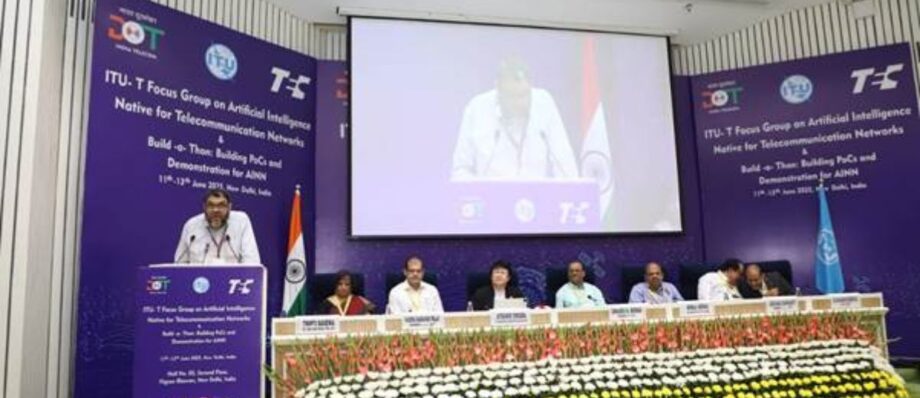India Hosts Crucial ITU AI-Native Telecom Summit in Delhi, Eyes Leadership in Standards
From June 11 to 13, 2025, New Delhi became the global hub for telecommunications innovation as India hosted the third meeting of the International Telecommunication Union (ITU) Focus Group on Artificial Intelligence Native for Telecommunication Networks (FG-AINN). Organized by the Telecommunication Engineering Centre (TEC) under the Department of Telecommunications (DoT), this summit marked a pivotal moment for India to assert its leadership in shaping AI-native telecom standards. With over 200 delegates from 40 countries, the event underscored India’s ambition to drive the future of 6G and intelligent network architectures.
The FG-AINN meeting focused on embedding AI directly into telecom networks, a paradigm shift promising self-optimizing, adaptive systems that enhance connectivity and reduce operational inefficiencies. Sanjeev Bidwai, Member (T) of the Digital Communications Commission, highlighted India’s strides in this domain, citing projects like Bharat Gen, an indigenous large language model (LLM) for Indian languages, and C-DOT’s work on network automation. These efforts position India to contribute significantly to global standards, ensuring AI-native networks support diverse use cases, from rural communication to disaster management.
A major highlight was the launch of the Build-a-Thon 2025, a collaborative innovation sprint held on June 13. This initiative invited startups, researchers, and industry leaders to co-create AI-driven telecom solutions under expert mentorship. Participants tackled real-world challenges, such as improving public safety networks and optimizing urban connectivity, reflecting India’s commitment to not only setting standards but also deploying practical technologies. The Build-a-Thon has generated buzz on X, with users praising India’s proactive approach to fostering innovation ecosystems.
India’s hosting of the summit aligns with its broader push to influence global telecom governance. The DoT announced India’s bid to host the ITU Plenipotentiary Conference (PP-30) and nominated Ms. M. Revathi for Director of the ITU Radiocommunication Bureau, signaling intent to secure key leadership roles. Experts note that India’s growing expertise in AI and 6G, coupled with its massive digital market, strengthens its case to shape international standards. The summit also built on discussions from the World Telecommunication Standardization Assembly (WTSA-24) held in Delhi in October 2024, where AI governance was a focal point.
The AI-native telecom vision promises transformative benefits, including reduced call drops, enhanced quality of service, and seamless urban-rural connectivity. However, challenges remain, such as ensuring interoperability and addressing data privacy concerns. The ITU emphasized the need for inclusive standards to prevent fragmentation among global stakeholders. India’s Sangam Digital Twin project, led by Kumud Jindal, showcased at the summit, demonstrated how AI-driven insights can revolutionize infrastructure planning, offering a model for other nations.
The summit also highlighted India’s indigenous technology push. TEC and IITs are spearheading research into network automation and digital twins, while tools like ASTR, a facial recognition system to combat digital fraud, underscore India’s focus on security. Official statements emphasized that AI-native networks will be critical for 6G, expected to roll out by 2030, with India aiming to lead in both research and deployment. This aligns with the Digital India initiative, which seeks to bridge the digital divide and enhance telecom infrastructure.
Public sentiment, as seen on X, reflects pride in India’s global leadership ambitions, though some users raised concerns about equitable access to AI-driven telecom services in rural areas. The summit’s success hinges on translating discussions into actionable standards that balance innovation with inclusivity. As India positions itself at the forefront of AI-native telecom, its ability to foster collaboration among global stakeholders will determine its lasting impact on the digital future.


